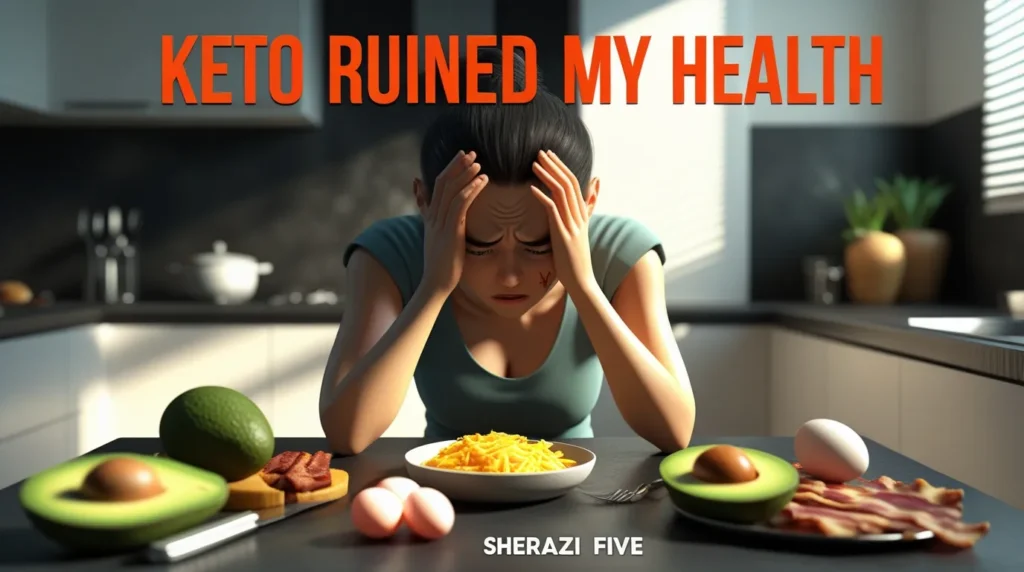The ketogenic diet has become a popular solution for rapid weight loss, but not everyone experiences positive results. Many individuals report serious issues, leading them to say, “Keto Ruined My Health.” While the diet promises fat burning and increased energy, it can also trigger keto side effects like fatigue, digestive problems, and nutrient deficiencies.
Some people face challenges with keto digestion and even heart health, as high-fat meals may affect cholesterol levels. Understanding the risks of this ketogenic diet is crucial before starting, so you can avoid potential long-term harm and make informed choices for your overall well-being.
Understanding the Keto Diet
The ketogenic diet is a high-fat, low-carb eating plan designed to force your body into ketosis, where it burns fat for energy instead of glucose. People often use keto for rapid weight loss and better mental clarity. While it works for some, it isn’t safe for everyone.
Many keto enthusiasts overlook the potential long-term effects. Restricting carbs drastically can cause fatigue, nutrient deficiencies, and digestive issues. It’s essential to understand the diet’s principles before diving in, or you may end up saying, “keto ruined my health.”
Common Health Issues from Keto

Following keto can trigger several unexpected health problems. One of the most common complaints is persistent fatigue. When your body adjusts to low carb intake, you might feel sluggish and weak. Other issues include headaches, nausea, and dizziness, especially during the first few weeks.
Another concern is the impact on blood sugar and hormone balance. Keto can cause spikes and drops that affect energy and mood. Many people don’t realize that keto isn’t just a weight-loss tool; it’s a stressful regimen on the body, and ignoring its effects may lead to saying, “keto ruined my health.”
Digestive Problems on Keto

A major side effect of keto is digestive distress. Many people experience constipation, bloating, and diarrhea due to low fiber intake. High-fat meals can also be heavy on the stomach, causing discomfort.
Even if you add keto-friendly vegetables, your gut might not adapt to such a drastic change. Over time, poor digestion can contribute to nutrient absorption problems and other gastrointestinal issues. This is another reason some individuals claim, “keto ruined my health.”
Impact on Heart Health

The high-fat nature of keto can create risks for your heart. Diets high in saturated fats may raise LDL cholesterol and increase cardiovascular risk. People with pre-existing heart conditions need to be especially cautious.
Even though keto can sometimes improve HDL (“good”) cholesterol, the balance between fats and heart health is delicate. Ignoring this balance can lead to long-term consequences, reinforcing why some say, “keto ruined my health.”
Keto and Mental Health
Your brain depends on glucose for energy, and keto significantly reduces glucose availability. This can lead to brain fog, irritability, anxiety, and mood swings. Many people underestimate how diet affects mental health.
Extended periods on keto can also increase stress hormone levels, making it harder to concentrate or stay positive. If you notice mood changes after starting keto, it’s a warning sign that your mental well-being may be at risk.
Long-Term Risks of Keto

Keto isn’t just a short-term challenge; it can pose serious long-term risks. Strain on the liver and kidneys is common, especially if you consume excessive protein and fats. The diet can also disrupt metabolism, making weight regain easier after stopping.
Other concerns include bone density loss, hormonal imbalance, and chronic fatigue. Ignoring these risks may make someone declare, “keto ruined my health,” particularly if they followed the diet for months or years without proper guidance.
Nutrient Deficiencies on Keto
Keto restricts many food groups, which can lead to deficiencies in vitamins A, C, D, magnesium, and fiber. This can affect everything from your energy levels to immune system function.
Even if you supplement, it’s often not enough. Missing out on essential nutrients can worsen fatigue, digestive problems, and heart health issues. This is one of the key reasons why long-term keto followers might regret their choice.
Weight Fluctuations and Keto

Although keto promises weight loss, not everyone achieves it. Some people experience weight plateau or gain, especially if they consume hidden carbs or too much protein.
Keto’s restriction can also trigger binge eating once the diet ends, resulting in rebound weight gain. Many who hoped for a healthier body end up frustrated and claim, “keto ruined my health.”
Who Should Avoid Keto
Keto isn’t for everyone. Individuals with liver, kidney, or pancreatic issues, pregnant women, and people with certain heart conditions should avoid it.
Even healthy individuals need to consider lifestyle factors. High-stress jobs, irregular sleep patterns, and a lack of medical supervision can make keto more harmful than helpful. Knowing your risk factors can prevent regret and health complications.
Safer Alternatives to Keto

If keto seems risky, there are healthier ways to lose weight and stay fit. Consider balanced low-carb diets, Mediterranean diet, or flexible dieting. These options allow moderate carbs and fats while minimizing health risks.
You can also focus on whole foods, fruits, vegetables, lean proteins, and healthy fats. This approach is sustainable, reduces digestive and heart risks, and avoids nutrient deficiencies, offering a healthier path than strict keto.
Keto Side Effects vs Safer Alternatives
| Side Effect | Keto Risk Level | Safer Alternatives |
|---|---|---|
| Fatigue | High | Moderate low-carb |
| Digestive issues | Moderate | High-fiber diet |
| Heart issues | Moderate | Mediterranean diet |
| Nutrient deficiencies | High | Balanced diet |
| Mood swings | Moderate | Regular balanced meals |
(Keto Ruined My Health)
FAQs
Why are people quitting keto?
People quit keto due to fatigue, digestive issues, and difficulty maintaining strict carb limits. Long-term health concerns also push some to stop.
Why don’t doctors recommend keto?
Doctors worry about nutrient deficiencies, heart risks, and unsustainable eating patterns. Keto can be harmful without proper supervision.
Did keto ruin my metabolism?
Keto may temporarily slow metabolism if done long-term or inconsistently. Recovery usually happens after returning to a balanced diet.
What do cardiologists think of the keto diet?
Cardiologists caution that high saturated fat can raise cholesterol and increase heart risks. Some prefer moderate low-carb approaches.
What is the downfall of keto?
The main downfall is difficulty sustaining it, nutrient deficiencies, digestive problems, and possible heart and kidney issues.
Why did Janelle Rohner quit keto?
She likely experienced side effects like fatigue, nutrient gaps, or health concerns, making keto unsustainable for her lifestyle.
How long is it safe to be in ketosis?
Short-term ketosis (weeks to a few months) is generally safe. Long-term ketosis should be monitored by a doctor.
Can keto mess up your gut?
Yes, low fiber and high-fat meals can cause constipation, diarrhea, and gut microbiome imbalance.
Who should not do keto?
People with liver, kidney, or pancreatic issues, pregnant women, or certain heart conditions should avoid keto.
What are the biggest mistakes people make on a keto diet?
Common mistakes include eating hidden carbs, ignoring nutrient intake, and overdoing protein or fat.
What is the healthiest diet?
Balanced diets like the Mediterranean diet with fruits, vegetables, lean protein, and healthy fats are healthiest.
Can keto cause B12 deficiency?
Yes, because keto limits foods rich in B12 like fortified grains and some vegetables, supplementation may be needed.
How to tell if you’re in ketosis?
Signs include bad breath, weight loss, increased energy, and testing ketone levels in blood or urine.
What nutrients are missing from a keto diet?
Keto often lacks fiber, vitamin C, magnesium, potassium, and B vitamins due to limited fruits and grains.
Is peanut butter keto?
Yes, peanut butter can be keto-friendly if unsweetened and consumed in moderation.
Conclusion
The keto diet may work for some, but it isn’t without risks. Many people end up saying, “keto ruined my health”, due to fatigue, digestive issues, heart strain, or nutrient deficiencies. Before starting keto, consider your personal health, consult a doctor, and explore safer alternatives.
A sustainable, balanced diet often offers better long-term results without compromising health. Remember, losing weight isn’t worth sacrificing your overall well-being.





Pingback: How To Lower Blood Pressure While On Testosterone A Complete